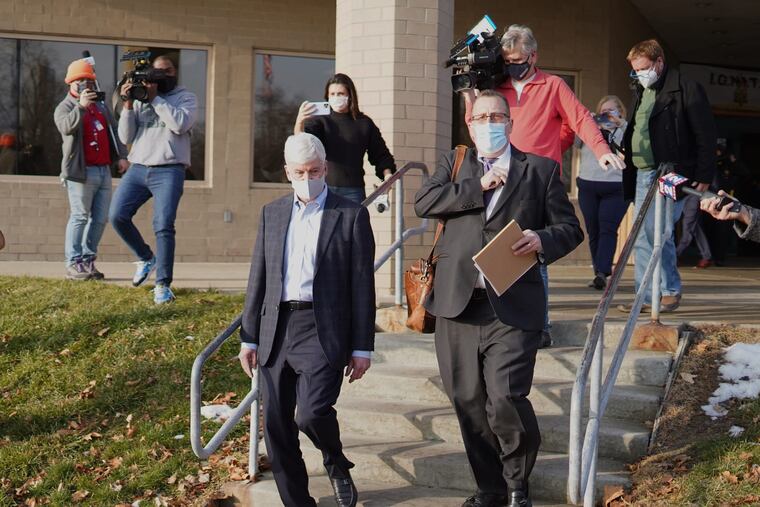The Flint indictments are a reminder of Pa.’s failure to protect children from lead poisoning | Opinion
Despite Philadelphia law to step up lead remediation, children and taxpayers are still suffering the pain and paying the costs.

When Rick Snyder, Michigan’s former governor, was finally charged last month with two counts of willful neglect of duty in the Flint, Mich., water crisis, the courts of the Great Lake State showed the nation their will to hold someone accountable for poisoning hundreds of children. In Philadelphia, babies are stricken with lead poisoning at twice the rate of babies in Flint. To say the least, that should compel the Keystone State to up its game to protect children.
Thankfully, Philadelphia City Council got the message and stepped up protections for babies from lead poisoning when it passed the most protective childhood lead poisoning law in the nation in 2019. That law now requires landlords to test rental units at least every four years and to remediate any hazards if found.
» READ MORE: Ex.-Michigan Gov. Rick Snyder charged in Flint water crisis
Yet, children and taxpayers are still suffering the pain and paying the costs. Kevin Osterhoudt, medical director of the Poison Control Center at CHOP and member of the Lead Free Philly Coalition, aptly yet tragically describes lead poisoning as a burglar that steals children’s potential. Another coalition member, Erica Miller, the mother of twin toddlers poisoned by lead paint in their rental home, says, “The bottom line is that I won’t know what [my children’s] full potential will be because, at the end of the day, they got lead poisoning.”
Babies are most at risk for lead poisoning — and Black and Latino babies, in particular. In Philadelphia, approximately 2,000 babies are poisoned every year, and African American and Hispanic babies are poisoned at a rate 4.5 and 1.4 times higher, respectively, than white babies. Poisoning can cause serious adverse effects such as damage to the brain and nervous system, slowed growth and development, hearing and speech problems, behavioral issues, and underperformance in school.
What’s unique about this childhood illness is that it’s entirely preventable. We can’t say that about a lot of health conditions, yet it’s true in this case. Most children get lead poisoned by ingesting or breathing in lead-based paint dust in their older homes caused by chipping and peeling paint.
So, the answer is relatively straightforward: remove lead paint hazards from homes.
To end this form of environmental racism, paint companies should be required to do their part to remove the remnants of the paint they sold that still coats the walls of homes 43 years after Congress banned the sale of this toxic product. Kudos to Montgomery and Lehigh Counties, who’ve mounted a compelling suit in the Pennsylvania courts to force these companies to the table, and to Delaware County, who is considering doing so. A similar court case in California was won over the course of nearly 20 years and produced hundreds of millions to get the lead out of homes.
We must not wait for the Pennsylvania case to be won. Currently, the state does not provide any funding to get the lead out of homes and apartments. While the governor has made lead poisoning prevention a priority and found funds to address lead in the water in child-care centers, he’s proposed no funding to address the No. 1 culprit: lead paint in our homes.
» READ MORE: Lead poisoning is a crisis Philadelphia can actually fix | Editorial
As a Northeastern state, we have tens of thousands of homes built before lead paint was banned. Many have been cleaned of lead over those decades. Given that only a third of children are tested for lead exposure annually, and those tests tell us 9,000 suffer from lead poisoning, the need to clear our housing stock of lead should remain a top priority.
Before the state budget is passed this June, lawmakers would be wise to create a fund that will help low-income families and landlords remove lead hazards from their properties. Doing so will save taxpayers millions in legacy costs associated with lead poisoning — including substantial expenditures in health care for these children for speech and physical therapy and mental health services, as well as special education services and juvenile justice system involvement.
In the meantime, Philadelphia is moving the needle in a positive direction. Outreach is underway, particularly in the communities where most children test positive for lead poisoning, to let landlords know they must test for lead hazards, and if hazards are found, that there are some funds for landlords with financial hardships to remove them.
» READ MORE: Toxic city: the ongoing struggle to protect Philadelphia’s children from environmental harm
But it’s just a drop in the bucket. The state and federal governments need to step up. The residents of Michigan held their leadership accountable. Now it’s time for us to urge our policymakers to get the lead out and give the youngest Pennsylvanians a chance to achieve their full potential.
If you live or work in Philadelphia, contact us to learn more about Philly’s new lead law and how to spread the word to tenants and landlords.
Phil Lord is the executive director of TURN, Colleen McCauley is the health policy director at PCCY (Public Citizens for Children and Youth), and both are part of the Lead Free Philly Coalition and Pennsylvania’s Prenatal to Age Three Collaborative. Contact them at phil.lord@ourturn.net and colleenm@pccy.org.